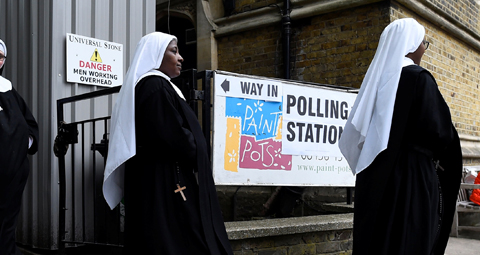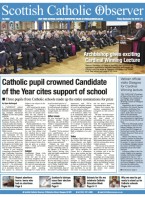BY No Author | February 16 2018 | ![]() 0 COMMENTS
0 COMMENTS ![]() print
print

Secular fundamentalists are ‘denying Christians a voice’
Publication Date: 2018-02-16
Church’s parliament representative criticises ‘new secular religion with a fundamentalist doctrine’ — By JAMES FARRELL and DANIEL HARKINS
A ‘new secular religion with a fundamentalist doctrine’ is denying ‘Christians a voice in the public square,’ the director of the Catholic Parliamentary Office has said.
Anthony Horan was exploring the question ‘Politics, a Place for Catholics?’ as part of the Faith Forum talks at Glasgow University’s Turnbull Hall on Thursday February 1.
Mr Horan quoted a column in The Guardian that said that MPs who give priority to their religious views ‘should leave the House of Commons,’ and said the implication was that ‘religious views or views informed by religion have no right to be heard in public debate.’
“This is becoming all too typical in society and is part of a creeping movement to deny Christians a voice in the public square,” he said.
He said Christian politicians like Tim Farron, the former leader of the Lib Dems, and Elaine Smith, the Labour MSP for central Scotland, had been ‘hounded’ in the past for their Christian beliefs. The views of Christian politicians are ‘simply not tolerated,’ he said. “We live in an age of a new orthodoxy; in many respects it’s almost a new secular progressive religion with a fundamentalist doctrine, ridiculing and even abusing those who don’t adhere to it,” Mr Horan added.
MSPs’ reactions
Elaine Smith has been on the receiving end of repeated attacks over her vote against changing the definition of marriage in 2014. Her vote was repeatedly criticised again on her appointment as shadow secretary for poverty and inequality at the end of last year.
“The same-sex marriage debate was supposed to be respectful, but ever since my vote I have been attacked as homophobic,” she said. “There didn’t seem to be any respect in that debate for Catholic and Christian beliefs.”
She said there is less room for Christian voices in debates over issues such as euthanasia, and added that it is ‘increasingly difficult to hold religious views in our society.’
“There certainly is a rise in secularism, and not just a push to promote secularism but a desire to attack Christianity,” she said. “That is worrying because it means people will be afraid to speak out and it sends a message to young Catholics and Christians that there is not a place for them in our representative democracy.”
She added that while there is a focus on rights for the LGBT community and other minority groups, Christians also are deserving of equal treatment, and she highlighted a trend in Scottish society of overlooking anti-Catholicism and its victims.
John Mason, the SNP MSP for Glasgow Shettleston, is a member of the Baptist Church. He said that the political realm is more secular than the general public and that ‘the majority of the public are not anti-faith.’
“You see it when there has been some disaster—people suddenly want somebody to be praying and government ministers will attend church services,” he said. “I’m fairly optimistic—not all young people are anti-faith; they just don’t have any experience of it,” he added.
“The newer generation of political leaders—like Nicola Sturgeon—are just a bit ill at ease, while the previous generation—people like Alex Salmond—were perfectly comfortable with a church service, even if they themselves didn’t have a faith.”
Speak up
Mr Horan, the Catholic parliamentary officer for Scotland, is tasked with engaging with the work of parliament and the Scottish Government to ensure that the Church’s voice is heard. His talk came as part of a series on Faith in the public square.
“How do we engage with politics given this animosity?” he asked.
One attendee pointed out that ‘it can be difficult for Catholics to find a candidate who really represents their views’ and asked if he should ‘just spoil my ballot.’
“Please whatever you do, don’t spoil your ballot,” Mr Horan said. “Your voice has to be heard. Truthfully, we are picking from the best of a bad bunch. So question your candidates as much as you can on what is important to you. Make a list and compare responses on those important issues. Use that to inform your decision.
“We desperately, desperately need Christians in politics. Young people should not be put off because your voices are needed.”
Speaking after the talk, Mr Horan said: “There’s a real danger here that young Christians will be put off public office because their voice is seemingly no longer welcome and they are on a hiding to nothing if they dare to raise their head above the parapet.
“It’s important we speak up against this intolerance of Christians and our beliefs.”










